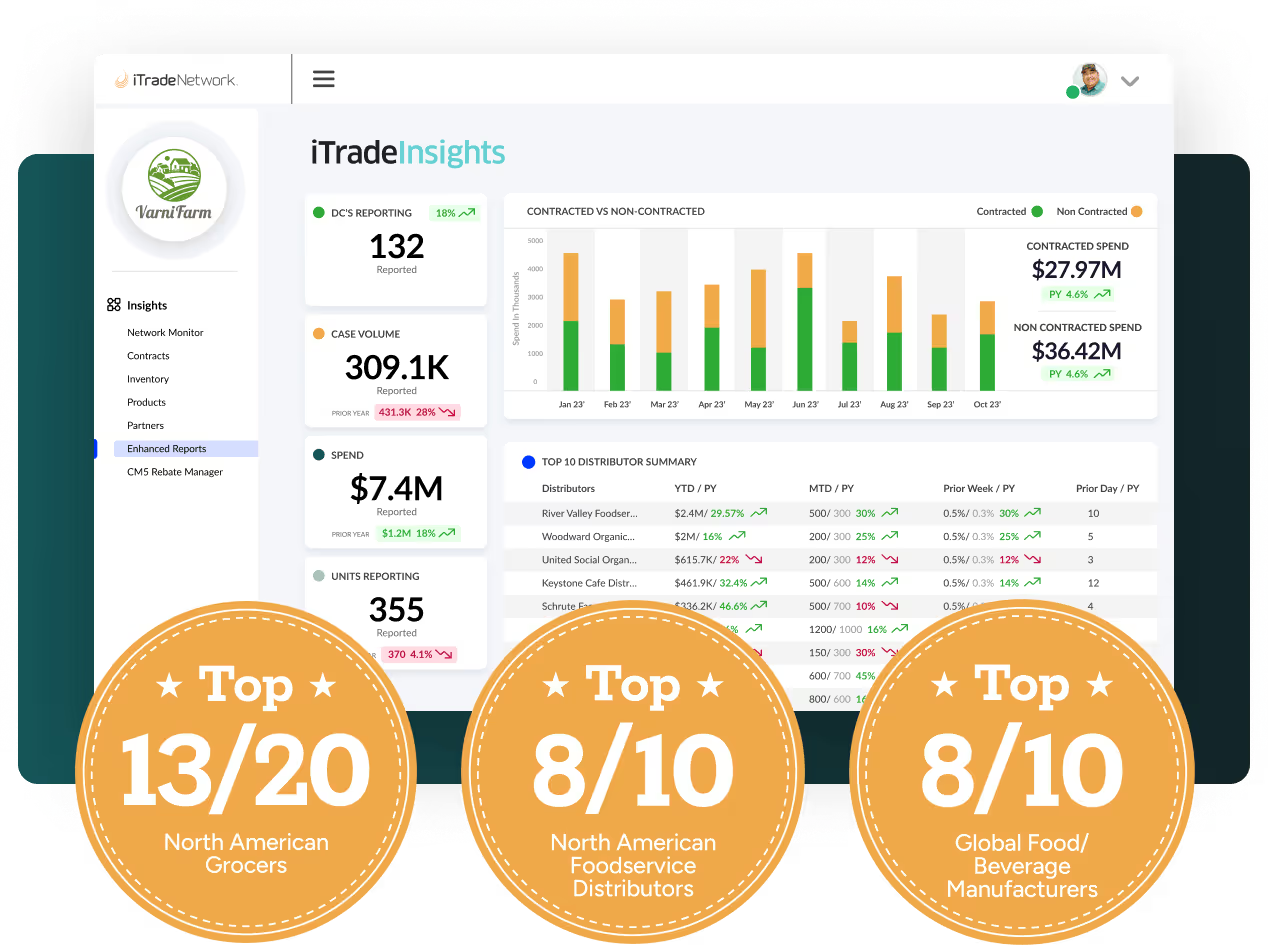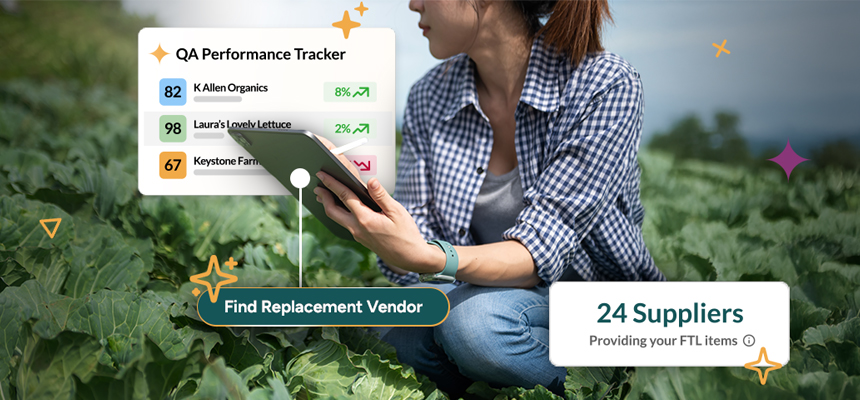Why Traceability is No Longer Optional: Insights from Industry Leaders

In an era where transparency, trust, and efficiency drive consumer and business decisions, traceability has emerged as a cornerstone of the modern food supply chain. Yet, despite its critical importance, many companies struggle with inconsistent data standards, outdated technology, and fragmented industry practices. As food safety and customer expectations grow, adopting robust traceability systems is no longer just a regulatory requirement—it’s a strategic advantage.
iTradeNetwork sat down with thought leaders from across the supply chain to discuss traceability challenges and opportunities. Their insights underscored how collaboration and innovation can drive value for all stakeholders.
Here’s what we learned about how traceability can transform the food supply chain—and how each player can play a pivotal role.
Why Traceability is a Priority for Everyone in the Supply Chain
A recurring theme is that traceability isn’t just about compliance—it’s about trust, efficiency, and business resilience. As Chad Clayborne, Director of National Accounts at Clemens Food Group, stated, “Traceability is about more than just knowing where your products come from. It’s about building confidence with your customers and ensuring your brand is future-ready.”
Challenges Hindering Progress
While the benefits are clear, many companies still face significant barriers to implementing traceability systems:
Data Inconsistency: Inconsistent or incomplete product data—such as GTINs—leads to inefficiencies and incorrect tracking. Many suppliers and distributors struggle with maintaining data accuracy due to varying formats and systems.
Technological Gaps: Legacy systems like DOS and outdated ERP platforms dominate parts of the industry, especially among smaller distributors. Upgrading these systems can be expensive and time-consuming, deterring adoption.
Fragmented Ecosystems: Traceability requires collaboration across the supply chain. When one partner fails to maintain accurate data, the entire system suffers. Many businesses operate in silos, making seamless integration challenging.
Suppliers: Safeguarding Quality and Building Trust
Suppliers face the dual challenge of ensuring consistent product quality and providing traceability data that meets distributor and buyer expectations. Inaccurate or incomplete data can lead to contract violations, inefficiencies, and lost business opportunities.
Chad Clayborne, highlighted the importance of transparency in supplier operations. “Cleaner data, better data works better for all of us,” he said. “But the challenge is ensuring attribution goes far enough without disqualifying products unfairly. Not all products are produced the same, and we need systems that reflect that nuance.”
How Suppliers can Drive Efficiency and Trust through Traceability
- Better Risk Management: Suppliers can quickly identify and resolve issues like recalls, minimizing liability. This capability is crucial for safeguarding their brand reputation and avoiding costly legal implications stemming from traceability gaps.
- Improved Relationships: Suppliers with clear, accurate data build stronger trust with distributors and buyers. These relationships are vital for securing long-term contracts and collaborative partnerships, ensuring a steady business pipeline.
- Operational Efficiency: Access to precise traceability data enables suppliers to optimize their production schedules and inventory forecasting. This reduces waste, ensures timely deliveries, and supports more informed decision-making across operations.
Distributors: Streamlining Operations and Adding Value
Distributors often operate at the intersection of suppliers and buyers, managing complex data flows and ensuring seamless delivery. However, many still rely on outdated systems, creating inefficiencies and errors.
Jennifer Wood, Director of Sales and Marketing, Unity Advantage Group, LLC noted the critical need for distributors to modernize. “Many of our members are using systems built 20 years ago. Manual pricing updates and manual deductions are still the norm. We’re excited to bring them solutions that automate these processes and free up their teams to focus on growth.”
How Distributors can Streamline Operations for Enhanced Value
- Operational Efficiency: By automating processes such as pricing updates and inventory management, distributors reduce errors and cut down on time-consuming manual tasks. This not only lowers operational costs but also improves service levels for their trading partners.
- Improved Customer Trust: Reliable traceability systems allow distributors to provide accurate and timely information to their buyers. This positions them as dependable partners capable of ensuring supply chain integrity.
- Regulatory Compliance: With seamless data integration, distributors can effortlessly meet complex regulatory requirements, avoiding fines or disruptions due to non-compliance with food safety laws.
Buyers: Enhancing Customer Trust and Reducing Risk
Buyers need to ensure product safety and origin while managing costs and customer expectations. Traceability provides the transparency they need but requires consistent data across the supply chain.
Taylor Crown, Food Service Leader at Accenture, added that traceability enhances decision-making. “In addition to regulatory compliance, we recommend companies throughout the food value chain consider business benefits such as food processing intelligence and ability to identify issues in real time, improved planning and decision making, brand reputation through customer and consumer trust, and identifying supply chain nodes where wastage is occurring, enabling a more circular, sustainable food ecosystem.”
How Buyers can Build Loyalty and Reduce Risk
- Customer Loyalty: Transparency reassures customers and enhances brand reputation.
- Faster Recalls: Accurate data ensures immediate responses to safety issues.
- Strategic Sourcing: Data insights allow buyers to optimize suppliers and products for better margins and quality.
Traceability: A Shared Path to Success
As the panelists emphasized, traceability only works when suppliers, distributors, and buyers collaborate. Each has a role to play, but their efforts must align to unlock the full potential of traceability.
The panel made one thing clear: traceability is no longer a competitive advantage for a few; it’s the cost of doing business. When suppliers, distributors, and buyers work together, they unlock immense value:
- Suppliers gain better visibility into demand and improve production planning.
- Distributors enhance efficiency and build trust with both suppliers and buyers.
- Buyers ensure product quality, safety, and origin while making smarter business decisions.
As Jennifer Wood summed up, “Traceability isn’t just about technology—it’s about partnership. When we collaborate, we don’t just solve problems. We build a better, more resilient supply chain.”
What’s Next?
As technology advances and consumer expectations evolve, traceability will play an increasingly central role in food supply chains. Traceability is an ongoing journey, but it starts with actionable steps:
- Suppliers: Invest in accurate data collection and transparent processes.
- Distributors: Modernize systems to automate and integrate traceability data.
- Buyers: Engage suppliers and distributors in co-creating solutions that enhance transparency.
By viewing traceability not as a regulatory checkbox but as a driver of trust, efficiency, and growth, businesses can unlock its full potential. In the end, traceability isn’t just about knowing where your products come from—it’s about ensuring your business is positioned to thrive in an ever-changing market.
Ready to join the journey? Let’s work together to create a supply chain that benefits everyone. Learn more about our traceability solutions here.
Speak to an Expert
Take a closer look at the platform built for buyers and their trading partners

Why Traceability is No Longer Optional: Insights from Industry Leaders
In an era where transparency, trust, and efficiency drive consumer and business decisions, traceability has emerged as a cornerstone of the modern food supply chain. Yet, despite its critical importance, many companies struggle with inconsistent data standards, outdated technology, and fragmented industry practices. As food safety and customer expectations grow, adopting robust traceability systems is no longer just a regulatory requirement—it’s a strategic advantage.
iTradeNetwork sat down with thought leaders from across the supply chain to discuss traceability challenges and opportunities. Their insights underscored how collaboration and innovation can drive value for all stakeholders.
Here’s what we learned about how traceability can transform the food supply chain—and how each player can play a pivotal role.
Why Traceability is a Priority for Everyone in the Supply Chain
A recurring theme is that traceability isn’t just about compliance—it’s about trust, efficiency, and business resilience. As Chad Clayborne, Director of National Accounts at Clemens Food Group, stated, “Traceability is about more than just knowing where your products come from. It’s about building confidence with your customers and ensuring your brand is future-ready.”
Challenges Hindering Progress
While the benefits are clear, many companies still face significant barriers to implementing traceability systems:
Data Inconsistency: Inconsistent or incomplete product data—such as GTINs—leads to inefficiencies and incorrect tracking. Many suppliers and distributors struggle with maintaining data accuracy due to varying formats and systems.
Technological Gaps: Legacy systems like DOS and outdated ERP platforms dominate parts of the industry, especially among smaller distributors. Upgrading these systems can be expensive and time-consuming, deterring adoption.
Fragmented Ecosystems: Traceability requires collaboration across the supply chain. When one partner fails to maintain accurate data, the entire system suffers. Many businesses operate in silos, making seamless integration challenging.
Suppliers: Safeguarding Quality and Building Trust
Suppliers face the dual challenge of ensuring consistent product quality and providing traceability data that meets distributor and buyer expectations. Inaccurate or incomplete data can lead to contract violations, inefficiencies, and lost business opportunities.
Chad Clayborne, highlighted the importance of transparency in supplier operations. “Cleaner data, better data works better for all of us,” he said. “But the challenge is ensuring attribution goes far enough without disqualifying products unfairly. Not all products are produced the same, and we need systems that reflect that nuance.”
How Suppliers can Drive Efficiency and Trust through Traceability
- Better Risk Management: Suppliers can quickly identify and resolve issues like recalls, minimizing liability. This capability is crucial for safeguarding their brand reputation and avoiding costly legal implications stemming from traceability gaps.
- Improved Relationships: Suppliers with clear, accurate data build stronger trust with distributors and buyers. These relationships are vital for securing long-term contracts and collaborative partnerships, ensuring a steady business pipeline.
- Operational Efficiency: Access to precise traceability data enables suppliers to optimize their production schedules and inventory forecasting. This reduces waste, ensures timely deliveries, and supports more informed decision-making across operations.
Distributors: Streamlining Operations and Adding Value
Distributors often operate at the intersection of suppliers and buyers, managing complex data flows and ensuring seamless delivery. However, many still rely on outdated systems, creating inefficiencies and errors.
Jennifer Wood, Director of Sales and Marketing, Unity Advantage Group, LLC noted the critical need for distributors to modernize. “Many of our members are using systems built 20 years ago. Manual pricing updates and manual deductions are still the norm. We’re excited to bring them solutions that automate these processes and free up their teams to focus on growth.”
How Distributors can Streamline Operations for Enhanced Value
- Operational Efficiency: By automating processes such as pricing updates and inventory management, distributors reduce errors and cut down on time-consuming manual tasks. This not only lowers operational costs but also improves service levels for their trading partners.
- Improved Customer Trust: Reliable traceability systems allow distributors to provide accurate and timely information to their buyers. This positions them as dependable partners capable of ensuring supply chain integrity.
- Regulatory Compliance: With seamless data integration, distributors can effortlessly meet complex regulatory requirements, avoiding fines or disruptions due to non-compliance with food safety laws.
Buyers: Enhancing Customer Trust and Reducing Risk
Buyers need to ensure product safety and origin while managing costs and customer expectations. Traceability provides the transparency they need but requires consistent data across the supply chain.
Taylor Crown, Food Service Leader at Accenture, added that traceability enhances decision-making. “In addition to regulatory compliance, we recommend companies throughout the food value chain consider business benefits such as food processing intelligence and ability to identify issues in real time, improved planning and decision making, brand reputation through customer and consumer trust, and identifying supply chain nodes where wastage is occurring, enabling a more circular, sustainable food ecosystem.”
How Buyers can Build Loyalty and Reduce Risk
- Customer Loyalty: Transparency reassures customers and enhances brand reputation.
- Faster Recalls: Accurate data ensures immediate responses to safety issues.
- Strategic Sourcing: Data insights allow buyers to optimize suppliers and products for better margins and quality.
Traceability: A Shared Path to Success
As the panelists emphasized, traceability only works when suppliers, distributors, and buyers collaborate. Each has a role to play, but their efforts must align to unlock the full potential of traceability.
The panel made one thing clear: traceability is no longer a competitive advantage for a few; it’s the cost of doing business. When suppliers, distributors, and buyers work together, they unlock immense value:
- Suppliers gain better visibility into demand and improve production planning.
- Distributors enhance efficiency and build trust with both suppliers and buyers.
- Buyers ensure product quality, safety, and origin while making smarter business decisions.
As Jennifer Wood summed up, “Traceability isn’t just about technology—it’s about partnership. When we collaborate, we don’t just solve problems. We build a better, more resilient supply chain.”
What’s Next?
As technology advances and consumer expectations evolve, traceability will play an increasingly central role in food supply chains. Traceability is an ongoing journey, but it starts with actionable steps:
- Suppliers: Invest in accurate data collection and transparent processes.
- Distributors: Modernize systems to automate and integrate traceability data.
- Buyers: Engage suppliers and distributors in co-creating solutions that enhance transparency.
By viewing traceability not as a regulatory checkbox but as a driver of trust, efficiency, and growth, businesses can unlock its full potential. In the end, traceability isn’t just about knowing where your products come from—it’s about ensuring your business is positioned to thrive in an ever-changing market.
Ready to join the journey? Let’s work together to create a supply chain that benefits everyone. Learn more about our traceability solutions here.
Unlock It Now!



